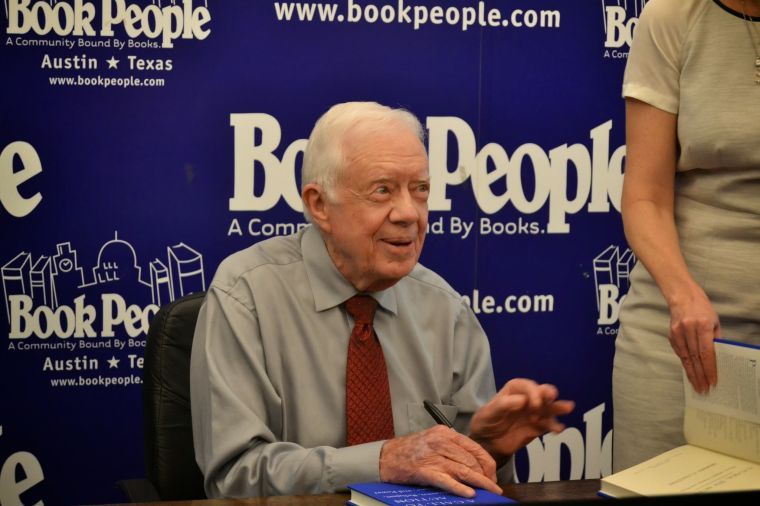Before LBJ Summit speech, Carter stops by BookPeople for book signing
A former president stopped by BookPeople this afternoon to sign copies of his newest book.
Former President Jimmy Carter started signing copies of “A Call to Action,” his 28th book, at 12 p.m. The book focuses on issues of women’s rights in the context of religion, violence and power. Along with signing books, Carter is in Austin for the LBJ Civil Rights Summit; he will speak tonight. Other speakers include former President Bill Clinton, former President George W. Bush and current commander-in-chief Barack Obama.
During a break from signing books, Carter answered questions pertaining to the issues of women’s rights examined in the book.
“Recently the education department has mandated that Title IX also be applied to sexual assaults,” Carter said. This is an expansion of Title IX from its original intention of giving women equal rights to participation in sports. The mandate requires that colleges and universities across the country “have an effective means to encourage women to report sexual assaults—rapes—instead of just looking the other way,” Carter said.
“I think Title IX, if enforced, can have a great beneficial effect” Carter said regarding incidents of sexual assault. “The thing that needs to be done is to convince the faculty and the girls who go to school — and the boys who don’t participate in serial rape — that…these crimes should be reported.”
After his pause to speak to the media, Carter continued to sign books for the people who had waited in line outside BookPeople since mid-morning.
The line stretched outside the BookPeople parking lot and around the corner onto the sidewalk of Henderson Street. Once ushered inside, groups of fifty people made the circuit up to the third floor where the president churned out signatures on hundreds of books.
When people previously unaware of the event realized what the crowd outside was waiting for, many of them joined the 600 people who had purchased tickets in advance and bought a last-minute ticket of their own on the spot.
“You mean right now? He’s going to be here now?” Chanel Haynes-Schwartz asked herself when she realized that Carter was signing books. “You can’t walk away from this kind of opportunity.”
Haynes-Schwartz expressed an interest in the angles from which the book examines issues of women’s rights.
“I’m really excited about women, religion, violence and power. He got my attention right there,” Haynes-Schwartz said.
“As an African American woman I feel beyond honored and humbled that a man of his caliber — living legend — has so much compassion and care about minorities,” Haynes-Schwartz said. Shortly thereafter, she entered the store to retrieve her signed copy of the book.
“I think he’s one of the best presidents we’ve had,” the owner of a hair salon on 29th and San Gabriel Street Addie Gonzalez said. Gonzalez’s approval of Carter did not translate to her opinions about the status of ensuring women’s right in the United States today.
“A little worried about how things are going,” is how Gonzalez described her thoughts on the matter.
“For somebody my age, it’s disappointing,” Gonzalez said. At 68 years old, the hairstylist lamented, “we’ve gotten this far, and we’re kind of going backwards.”
That regression is a matter of concern to women’s rights activists.
Carter compared the inequality women entering the workforce out of college encounter to issues that were present during the Civil Rights movement. He specifically remarked on how groups who benefit from inequality tend to try to maintain the status quo.
“During the civil rights years was that we white people — some of us didn’t agree with the separate but equal, but we didn’t say much about it because we benefitted,” Carter said. He drew the parallel of that racial inequality to the one between men and women today.
“That’s the way men feel today; we know it’s not right, but why rock the boat?”







